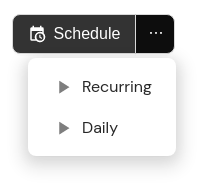Executions
Executions are the central part of your automation. Each execution represents a piece of automation which is or was running. Executions can be of type:
FLOWorSCRIPTwhich contain automation logicCONNECTIONwhich are connections to third party systemSCHEDULEwhich execute other flows periodically
Concept
Creating Executions
Executions can be created in several ways:
Using the User Interface
You can manually create executions of flows using the user interface. Navigate to the flow you want to start and click on "Run" or "Try" to start the execution in productive or development mode respectively:


Run and try buttons
Find more information about the development and productive modes in Development and Productive Mode
The flow is executed once and immediately.
Helper to Create a Schedule
The scheduling plugin adds additional buttons to the flow view which help you to manually configure a schedule for your flow:

Schedule dropdown and buttons
Clicking on the "Recurring" or "Daily" buttons will execute a helper flow which assists you in creating a new schedule. The helper flow will create a message form for you to configure the details of the schedule:

Header of the "create recurring schedule" helper execution
Click on the "Open Message" button to switch to the message form. Once you fill out the form and press the "submit button" the helper will create a schedule for you.
It is also possible to create schedules without using the helper flow. Please refer to Using Schedules for more information.
Using the REST API
To create an execution using the REST API make a HTTP POST request to
https://<your-workspace-name>.cloudomation.com/api/latest/execution
Please refer to the REST API documentation for details.
Using Webhooks
To create executions using a webhook, first you need to create and enable a webhook. Please refer to Webhooks for details.
Using Schedules
To create executions using a schedule, first you need to create and enable a schedule. Please refer to Scheduling for details.
By Executions
Executions can create other executions.
An execution creating synchronuous child executions of type FLOW, CONNECTION, and CONNECTION.
import flow_api
def handler(system: flow_api.System, this: flow_api.Execution):
this.flow('my-child-flow', custom_parameter='value')
this.connect('my-database', fetchval='SELECT 1+1')
this.connect(connector_type='REST', url='https://cloudomation.com')
return this.success('all done')